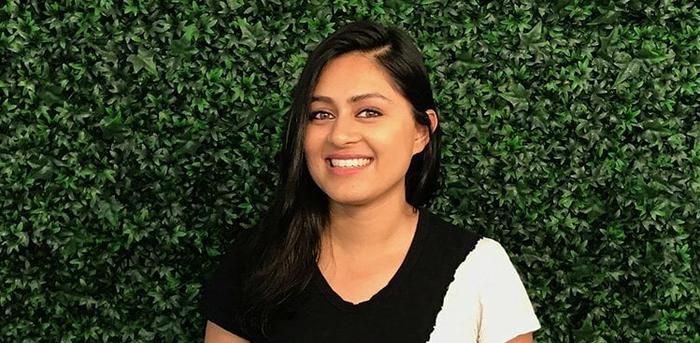
Neely Kartha, a full-stack engineer at The Muse, graduated college with two degrees—one in psychology and one in English. But two diplomas didn’t make her feel twice as confident about her future. In fact, it was quite the opposite—she was incredibly uncertain about what her next steps should be.
“I left college feeling less secure than when I entered,” Kartha explains. (I’m sure many of us can relate to this.) “Although I was on the pre-med track, I knew that was no longer the track I wanted to be on. So, I went the pre-law route instead.” But, after shadowing some lawyers and doing some work in the field, she realized that wasn’t right, either.
“I needed to reflect and think about what I loved doing,” says Kartha. “During this time, my mother and a co-worker encouraged me to consider software engineering. They both knew I liked problem-solving and being challenged creatively, so they thought it would be a good fit.” So, she took their advice and started experimenting with website development—and she loved it. “I love working with language in such a tangible way. And I really enjoy writing and being creative. This career path seemed like it would allow me to do both.”
To further explore her new passion, Kartha enrolled in a coding bootcamp that focused on user experience (UX), user interface (UI), and front-end development. This provided her with the opportunity to work on real-life client projects and compile a portfolio she could use in her job search.
After the bootcamp, she moved from Chicago to New York to explore a new city and gain new experiences. “I had a limited network and a lot of questions,” Kartha says. “So, I just kept practicing my new skill, attending coding meetups, and filling out applications.”
Her persistence paid off—she eventually landed an engineering job at The Muse.
What’s a Day in the Life of a Full-Stack Engineer Like?
Usually, it begins with a quick stand-up meeting in which engineers, designers, and our product manager convene to share individual updates on the status of our work, whether it’s in progress, completed, ongoing, or needs further input from engineering, product, or any other stakeholders. I spend the rest of the day building features, writing tests, and fixing bugs for the website.
What’s Your Favorite Part About Your Job?
My favorite parts are solving problems and the constant need to learn. For almost every project and code review, I have a list of takeaways and lessons. For example, while building our most recent product (more on that below), I got an opportunity to learn about and work with golang (a programming language that builds software). I also love being able to build products that positively impact our users.
Any Big Projects You’ve Worked on Lately That You’re Really Excited About? If So, What Excites You About It?
I’ve recently been a part of launching Discussions at The Muse! We’ve been working hard to create a place where users can ask burning career questions and receive quality answers from The Muse community (such as other Musers and career coaches). It’s been fun to work on issues that our team hasn’t tackled together before. We needed to think of all the ways users could interact with the site, what type of information they could input, and how to store this information.
I’m personally excited for this project because of how many various career paths I wandered down and career hurdles I had to jump over without knowing who to ask.
My hope is that our users will have a safe and trusted place to share their experiences and submit questions so they can feel supported as they go through the same experience.
How Did You Switch Your Mindset From Psychology and English to Engineering?
To be honest, I don’t think I’ve ever fully shifted mindsets. Ultimately, I’m happiest when building an engaging user experience and learning the best way to do so. My background in analytical thinking and writing has helped me do this because I need to understand what makes a great user experience, pull apart existing code, and create new code.
Plus, software engineering involves ongoing learning for people of all backgrounds—from art majors to computer science majors—in order to stay up-to-date with new technology. No matter what I majored in, I’d still need to learn these things.